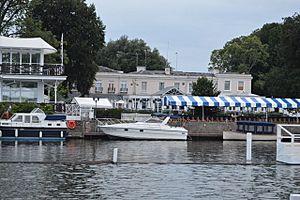William Whitelock facts for kids
William Whitelock (born December 27, 1636 – died November 22, 1717) was an important English lawyer and politician. He was known for being a member of the Tory political party. Sometimes his name is spelled Whitelocke or Whitlock.
Contents
Early Life and Family
William Whitelock was the second son of Sir Bulstrode Whitelocke, who was a well-known politician during the time of Oliver Cromwell. His mother was Frances Willoughby.
When he was young, William decided to become a lawyer. He joined a famous law school called the Middle Temple in 1647. By 1655, he had finished his training and became a "barrister," which is a type of lawyer who argues cases in court. In 1671, he married Mary Overbury.
Becoming a Politician
William Whitelock first became a Member of Parliament (MP) in 1659. He represented a place called Westlow in Cornwall. This Parliament was called by Richard Cromwell, Oliver Cromwell's son, but it didn't last long.
After the king was restored to power in 1660, William did not return to Parliament right away. He inherited his family home, Phillis Court, in Henley-on-Thames, in 1675.
Returning to Parliament
William Whitelock returned to politics after the Glorious Revolution in 1688. This was a time when King William III came to the throne.
- In 1689, he became a "King's Counsel," which is a special title for experienced lawyers who advise the King.
- He was also knighted, becoming "Sir" William Whitelock.
- In December 1689, he was elected as an MP for Great Marlow.
- He was re-elected for Great Marlow in 1690 and served until 1695.
In 1702, he became a Queen's Counsel for Queen Anne. Later, in 1703, he was elected to represent the University of Oxford in Parliament. This was a very important position. He continued to represent Oxford University even after England and Scotland joined together to form Great Britain in 1707. He was re-elected in 1708 and 1710.
Speaking in Parliament
In the 1715 election, William Whitelock was re-elected without anyone running against him for the University of Oxford. He was known for being a "Jacobite," which meant he supported the old royal family (the Stuarts) rather than the new King George I.
People in Parliament liked listening to him speak because he often made them laugh. For example, in March 1715, he spoke against a formal message to the King. In August, he was one of the few Tory speakers who argued against punishing some former Tory ministers. He also spoke against a law in April 1716 that would make Parliaments last longer.
Later Life and Legacy
Sir William Whitelock passed away at Phillis Court on November 22, 1717. He was buried at Fawley, Buckinghamshire, which was his family's main estate. He had many children, including five sons and eight daughters.
William Whitelock was known for being a very strong Tory and for liking old traditions. He had a quick wit and was not afraid to speak his mind, even to the King.
For example, once in Parliament, he was speaking and said, "as black as – ". An opponent quickly interrupted him, saying, "your shoe-strings!" Sir William calmly replied, "Sir, I remember when there were more shoe-strings and fewer coxcombs in this assembly!" (A "coxcomb" was a rude word for a foolish or vain person).
Another time, in 1714, he started a speech about the future King George I by saying, "If he ever comes to the throne, which I hope he never will..." This made some members very angry, and they demanded he take back his words. William Whitelock calmly explained that Queen Anne was younger than her appointed heir, and he simply hoped she would live longer than him.
 | Jessica Watkins |
 | Robert Henry Lawrence Jr. |
 | Mae Jemison |
 | Sian Proctor |
 | Guion Bluford |


